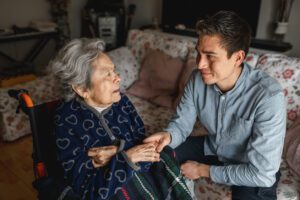Do’s and Don’ts for Visiting Someone with Dementia
 Just because people suffer from Alzheimer’s or dementia doesn’t necessarily mean they don’t want visitors. There will be days, of course, where they may prefer to be alone or keep to the routine, but at other times, they will feel more social.
Just because people suffer from Alzheimer’s or dementia doesn’t necessarily mean they don’t want visitors. There will be days, of course, where they may prefer to be alone or keep to the routine, but at other times, they will feel more social.
For visits from friends or family to be productive, it’s essential to set the situation up for success by communicating some do’s and don’ts so visitors know what they can do and say.
To begin with, the caregiver/host should set the tone by creating the right ambiance. Let potential visitors know some ground rules in advance. Only allow one or two visitors in at a time to avoid overwhelming the individual who has dementia. Be sure to schedule visits for the time of day when your older adult is usually at his or her best. Minimize distractions by turning off the television or any loud music. Keep the environment calm and quiet by asking anybody not visiting to enter a different room.
Below are 14 essential DO’s to remember when visiting someone with Alzheimer’s:
- Keep your tone and body language friendly and positive so as not to intimidate.
- Speak loud enough to be heard – but not too loudly.
- Stay at the person’s eye level the whole time, and keep solid eye contact.
- Even if the person knows you well, introduce yourself to avoid embarrassment or confusion if s/he is having a bad day. For example, say, “Hi, Grandma. This is your granddaughter, Emma.”
- Speak slowly and in short sentences. Introduce only one idea per sentence. For example, try something like, “Tell me how your daughter is doing.”
- Don’t rush the conversation. Give the person as much time as needed to speak or answer a question.
- Use open-ended questions like “What do you think of the weather today?” That way, there is no right or wrong answer, and the person can express an opinion.
- If s/he isn’t in the mood to talk, be content to sit in silence with the individual. That can be just as enjoyable for him or her.
- Let the older adult direct the conversation. Don’t force topics or activities.
- Allow the person to freely express emotions such as sadness, fear, or anger, and offer validation for these feelings.
- Go along with his or her version of reality during the conversation, even if things that aren’t true or don’t make sense come up.
- If you want to contribute to the conversation, bring up memories from the past. There’s a better chance the individual will remember things from long ago than recent events.
- If the conversation dwindles, bring along an activity or two that may interest the person. This could be a book, magazine, photo album, or music.
- If the senior gives permission, give hugs, gentle touches, or shoulder massages. Just stop if it seems s/he is no longer enjoying the touch.
Here are an additional seven DON’Ts to avoid during your visit:
- Don’t ask, “Do you remember this?” If the person doesn’t remember, it could cause anger or embarrassment.
- Don’t argue. Let inaccuracies slide rather than address them.
- Don’t point out mistakes. It’s not worth making the individual feel bad when you know the truth.
- Don’t assume his or her memory is entirely unreliant. Most people with dementia have moments of clarity when they remember things clearly.
- Don’t take mean words personally. As the disease ravages the person’s brain, words may get mixed up, or reactions such as confusion, fear, frustration, or anger may surface.
- Don’t talk down to the person as if he or she is a child. Show respect and understanding that the person who was always there is still present underneath the disease’s symptoms.
- Don’t talk about the person in the third person with someone else in the room, as if the individual can’t hear the conversation.
Remember first to bring up the topic of visitors with your older adult to see if s/he has any interest in social visits. If so, educate family and friends on the above points to ensure that it will be a positive experience for all parties involved.
